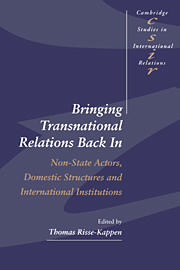 Bringing Transnational Relations Back In
Bringing Transnational Relations Back In Book contents
- Frontmatter
- Contents
- List of tables
- List of contributors
- Preface
- List of abbreviations
- Setting the agenda
- Case studies
- 2 Transnational relations and the development of European economic and monetary union
- 3 “Bullying,” “buying,” and “binding”: US–Japanese transnational relations and domestic structures
- 4 MNCs and developmentalism: domestic structure as an explanation for East Asian dynamism
- 5 Transnational relations, domestic structures, and security policy in the USSR and Russia
- 6 Mechanics of change: social movements, transnational coalitions, and the transformation processes in Eastern Europe
- 7 Ivory, conservation, and environmental transnational coalitions
- Conclusions: So what?
- Index
- CAMBRIDGE STUDIES IN INTERNATIONAL RELATIONS
4 - MNCs and developmentalism: domestic structure as an explanation for East Asian dynamism
Published online by Cambridge University Press: 02 December 2009
- Frontmatter
- Contents
- List of tables
- List of contributors
- Preface
- List of abbreviations
- Setting the agenda
- Case studies
- 2 Transnational relations and the development of European economic and monetary union
- 3 “Bullying,” “buying,” and “binding”: US–Japanese transnational relations and domestic structures
- 4 MNCs and developmentalism: domestic structure as an explanation for East Asian dynamism
- 5 Transnational relations, domestic structures, and security policy in the USSR and Russia
- 6 Mechanics of change: social movements, transnational coalitions, and the transformation processes in Eastern Europe
- 7 Ivory, conservation, and environmental transnational coalitions
- Conclusions: So what?
- Index
- CAMBRIDGE STUDIES IN INTERNATIONAL RELATIONS
Summary
Multinational corporations (MNCs) are important transnational agents in the contemporary global political economy. Although they can be viewed as economic actors following the logic of international markets, their activities inevitably arouse questions of national power as well. Not surprisingly, such questions are most pronounced in the study of developing countries, where weak governments and societies potentially give the MNCs a strong bargaining position. Thus, the nature of the relationship between MNCs and developing countries and the implications of this relationship for economic growth remain highly controversial. For several decades, the debate occurred primarily between modernization theory (which saw MNCs as promoting growth in the periphery) and dependency theory (which argued that MNCs prevented or distorted growth). More recently, statist theory has argued that “strong and autonomous” states can regulate MNCs, thereby making them contribute to national development.
We are interested in this chapter in analyzing the role played by a host country's domestic structures in shaping the access and impact of MNCs. Access in this case is a product of bilateral negotiation between the firms and the host government (which has political jurisdiction to bar entry). The terms and extent of this access reflect the joint interests of these actors and their reciprocal bargaining leverage. Access (even if limited) is a precondition for impact which, in our case, refers to the size (large versus small) and nature (positive versus negative) of the MNCs' influence on their host's economic growth. Therefore, MNC impact is our dependent variable, while MNC access is the intervening variable.
- Type
- Chapter
- Information
- Bringing Transnational Relations Back InNon-State Actors, Domestic Structures and International Institutions, pp. 112 - 145Publisher: Cambridge University PressPrint publication year: 1995
- 4
- Cited by


